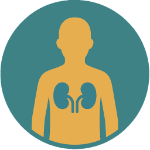Case Studies: Integrative Care in CKD
 Chronic Kidney Disease (CKD) is a condition that requires ongoing medical supervision, but many patients also explore complementary care to improve quality of life. Integrative treatment combines Western medical monitoring with Traditional Chinese Medicine (TCM) approaches such as acupuncture, herbs, diet, and gentle exercise. While each case is unique, looking at common scenarios can illustrate how this partnership works in practice.
Chronic Kidney Disease (CKD) is a condition that requires ongoing medical supervision, but many patients also explore complementary care to improve quality of life. Integrative treatment combines Western medical monitoring with Traditional Chinese Medicine (TCM) approaches such as acupuncture, herbs, diet, and gentle exercise. While each case is unique, looking at common scenarios can illustrate how this partnership works in practice.
Integrative Approaches
- Use acupuncture and acupressure to strengthen kidney energy
- Combine medical diets with kidney-supportive foods like walnuts and sesame
- Apply herbal formulas under professional guidance for yin or yang balance
- Practice qigong or taijiquan to maintain circulation and reduce stress
- Support emotional health with meditation, counseling, and social connection
In one scenario, a patient with early CKD has high blood pressure but no major symptoms. Western care focuses on blood pressure control and regular lab tests. A TCM practitioner may add acupuncture at points like (KI3 太溪 Tàixī) or (BL23 肾俞 Shènshū) to strengthen kidney energy, along with dietary advice to include gentle kidney-nourishing foods such as black sesame and walnuts. The goal is not only to preserve kidney function but also to maintain vitality and prevent further decline.
Another case involves a patient already experiencing fatigue, swelling, and poor sleep. Alongside medical treatment, acupuncture and acupressure can help reduce edema and promote relaxation. Herbal formulas may be considered to support yin or yang, depending on the pattern of imbalance. Dietary recommendations might include warming soups, congee, and teas made with goji berries or jujube. These small additions support comfort and improve energy, even when medical treatment remains the primary approach.
For patients on dialysis, integrative care often focuses on reducing side effects and supporting emotional health. Practices like qigong breathing exercises or taijiquan help maintain circulation and reduce stress, while counseling and meditation address the fear and anxiety often linked with chronic illness. In this way, TCM offers tools for both body and mind, creating a more complete support system.
These scenarios show how TCM does not replace Western medicine but complements it. By paying attention to energy, lifestyle, and emotions, it provides a broader foundation for living well with CKD. Patients who combine both approaches under proper guidance may find greater comfort, stability, and confidence as they navigate their journey with kidney disease.
Vocabulary Guide
- KI3 (太溪 Tàixī) – An acupoint on the Kidney meridian used to strengthen kidney yin and yang.
- BL23 (肾俞 Shènshū) – The back-shu point of the kidneys, often used to tonify and support kidney energy.
- Congee (粥) – A rice porridge recommended in TCM dietary therapy for gentle nourishment and digestion.
- Jujube (大枣 Dàzǎo) – A fruit often used in teas and soups to support energy and calm the mind.
- Qigong (气功) – Breathing and movement practices that harmonize energy and reduce stress.



